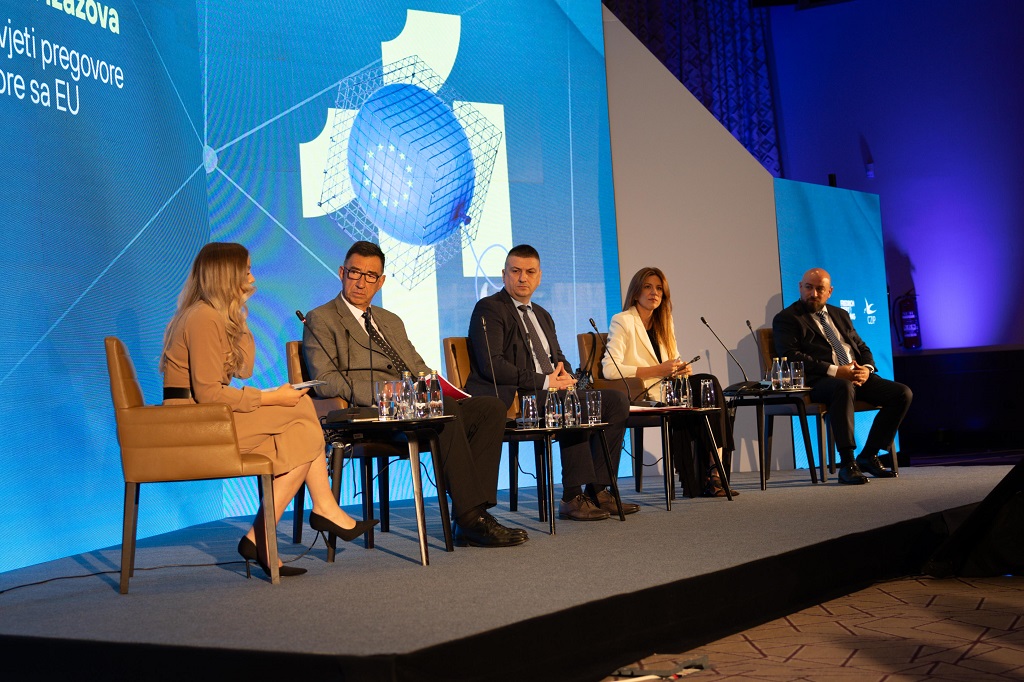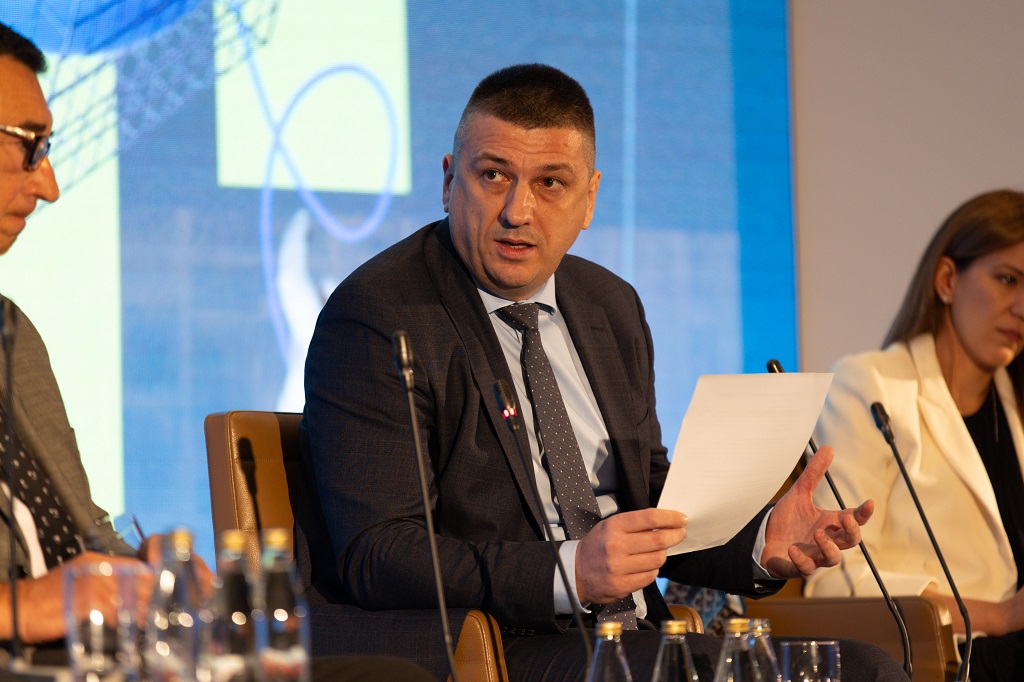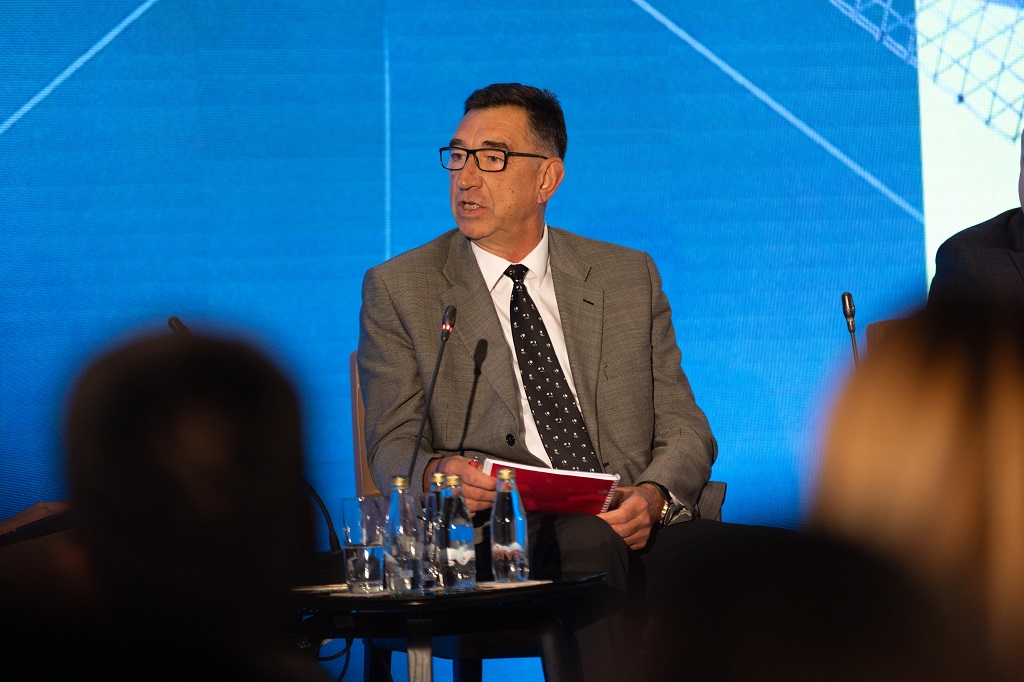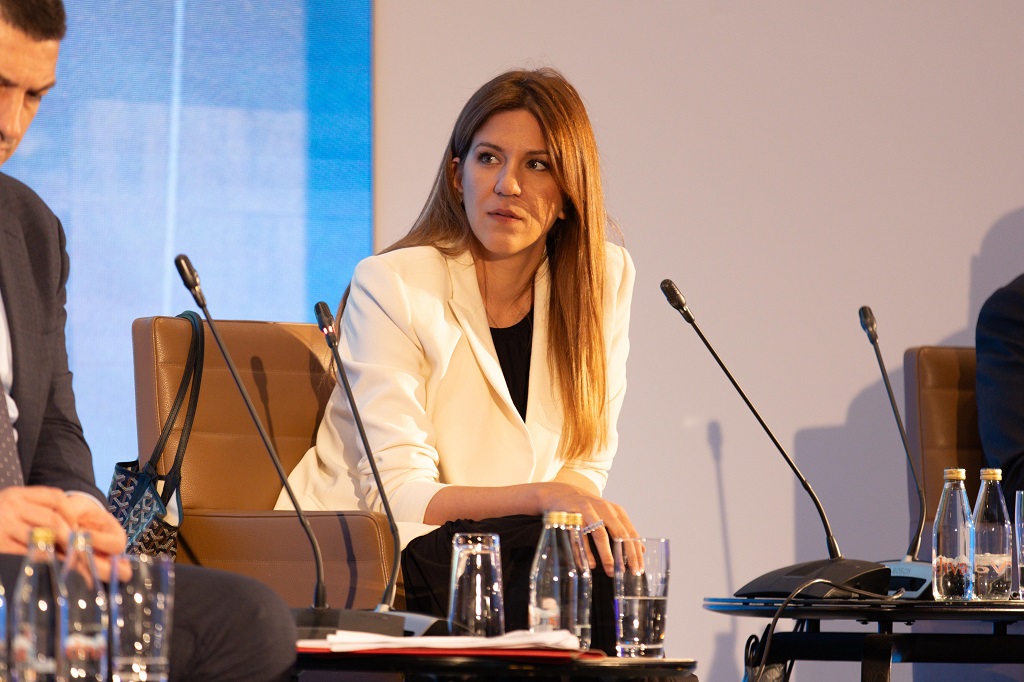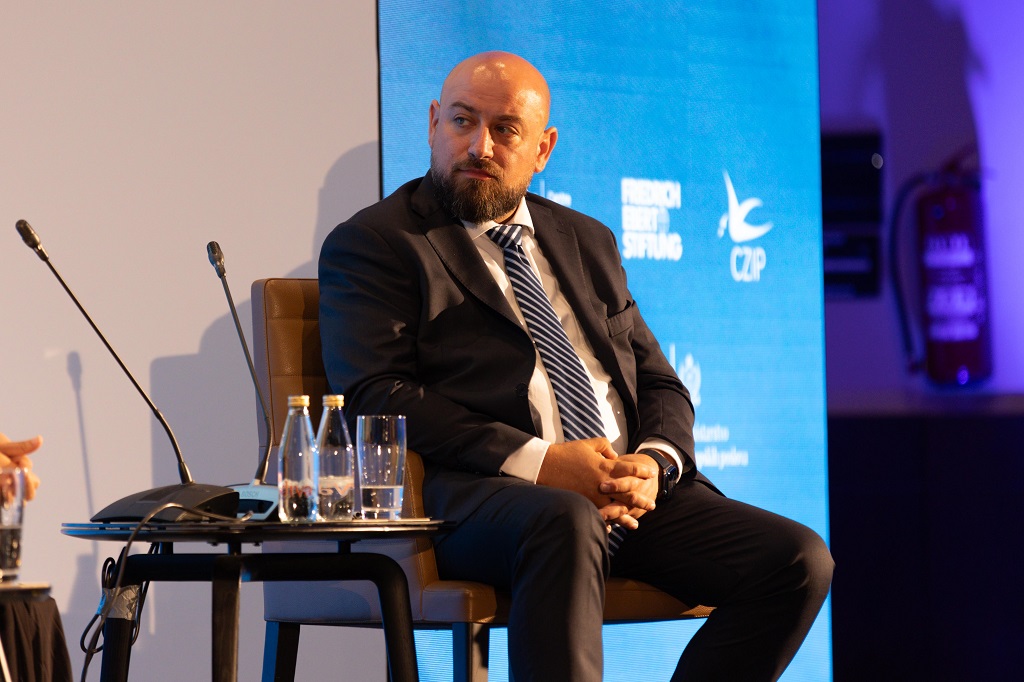Appointments in the judiciary, compromise of political entities and political will are necessary for the rule of law to be achieved in Montenegro, it was assessed at the conference “Review of 11 years of progress and challenges – how to revive Montenegro’s negotiations with the EU”, which was organized today by the Centre for Civic Education (CCE).
Chief Special Prosecutor Vladimir Novović, at the panel “Achieving the rule of law: is the goal in sight?”, said that he was satisfied with what the Special State Prosecutor’s Office (SSP) had done since May last year. “Not only am I satisfied, but this is also confirmed by the non-paper of the European Commission (EC), in which, among other things, it is said that Montenegro is at a turning point when it comes to the fight against organized crime and corruption,” said Novović.
Novović said that SSP identified problems and initiated changes of the Rulebook on the internal organization and systematization of workplaces. “The number of jobs in SSP has increased from 40 to 60. However, there is still a lack of human resources in quantitative and qualitative terms,” Novović pointed out. As he explained, the cyber attack last year slowed everything down and the hiring process is ongoing. “We hope to fill capacity by the beginning of September, that is, to have about 95 per cent occupancy,” said Novović. According to him, it is difficult to carry out the specialization of prosecutors, due to their very small number.
Novović said that one of their goals was to restore the public’s trust in SSP and, as he added, things are going in the right direction.
“We cannot solve the restrictions as SSP, these restrictions are the burden of others, it is necessary to provide infrastructure conditions”, said Novović and added that he considers that a Center for the storage of evidence should also be formed.
Speaking about the challenges, he assessed that the jurisdiction of the SSP is too broad and that one of the pressing problems is insufficient staffing of the Special Police Department (SPD). Novović also stated that there are currently eight special prosecutors effectively working in the SSP and that so far they have requested the referral of five prosecutors from other prosecutor’s offices. He emphasized that there is still no automatic data exchange, despite the Agreement from January 2021 between the Ministry of Internal Affairs, the Ministry of Finance, the Ministry of Justice, the Supreme State Prosecutor’s Office, the Supreme Court and the Judicial Council. He also explained that SSP, as a signatory to that Agreement, has access to the databases of the Revenue and Customs Administration only to the extent of the amount of money that a citizen has declared at the border crossing. As he said, the automatic exchange of data is not yet sufficiently applied and they have to use the traditional correspondence through letters, which makes work difficult.
Novović considers that the SSP has demonstrated non-selectivity and impartiality in its work. “All social factors should support our work and in that way give us an incentive to work even better and make even greater efforts in the fight against organized crime and high corruption,” said Novović.
He believes that it is necessary to change the Law on the Special State Prosecutor’s Office and reduce the number of competencies of the SSP. “The concept of a high-ranking public official should be included in that law, and the SSP should be competent if those officials commit a criminal offence,” added Novović. He also assessed that there should be no permanence of the prosecutorial function in the SSP.
Furthermore, he believes that a law should be passed to separate the SPD from the Police Directorate. “So, the SPD would represent a small police that is independent of the director of the Police Directorate and the Minister of Internal Affairs”, he explained.
In reference to the Government’s support, Novović said that it was only in the part of adopting the Rulebook on the internal organization and systematization of workplaces, as well as that to date there is no Government decision on the transfer of the old Government building to SSP and SPD, although there are some conclusions, and what is not enough for the investments of foreign partners in the adaptation of the space.
Asked about Prime Minister Dritan Abazović’s accusations against the leader of the Europe Now Movement Milojko Spajić before the elections, Novović said that the SSP has two cases formed regarding that issue and that they are continuously working on it.
The former judge of the Constitutional Court of Montenegro, Miodrag Iličković, reflected on the genesis of the collapse of the judiciary in Montenegro, noting that there is a remedy for the current state of the rule of law in Montenegro, but that a diagnosis must first be established.
“And the diagnosis is that the Government is in a technical mandate, without the Ministers of Foreign Affairs and Defense, that the Parliament has been dissolved, that only three judges of the Constitutional Court have been elected after six competitions, that the fifth competition for the Supreme State Prosecutor’s Office, nor the fourth competition for the Supreme Court has not been completed… To me, it looks like when you bring a man to an x-ray and you get an image, and then you see on the image that the man has no spine, no pelvis, no collarbone, and he is standing and you do not know what he is holding on to… To me, the system looks like that at the moment”, said Ilickovic.
He pointed out that the European average is 22 judges per 100,000 inhabitants, while in Montenegro there are 49 judges per 100,000 inhabitants.
As he said, the state can get away if a political agreement is reached. “We have to come together in difficult times, we have to choose these institutions and look at it as a patriotic issue,” said Iličković.
He also pointed out that the judicial apparatus must be clean in order to be ready to pull Montenegro towards everything that is required of it in the process of establishing a functional rule of law. “Without a clean judiciary, prosecutor’s office and police, the state cannot start further clean-ups. If we are talking about how we will gain confidence in the judiciary, we have to do something. We must first examine the property of judges, prosecutors and the police, a security check must be made. And at the root of every good policy lies compromise”, said Iličković and added that Montenegro has experience in this, through the creation of the Narodna sloga.
As he said, it is a political decision whether one wants the judiciary or power over the judiciary. He reminded that between 150-160 candidates passed through the Assembly in the appointments to the Constitutional Court, the Judicial Council and the Prosecutor’s Council, and that Montenegro does not have 100 million inhabitants, so it is “ rude and impudent “ to pass over someone’s career. “Is it possible that Montenegro can have that luxury, and that level of arrogance, that you listen to the candidates, that you ask him questions through which you see whether he is on this side or the other side – that is humiliation,” said Iličković.
Asked if he believes that the existing judicial crisis can be overcome with these political structures, he expressed his belief that it can. “For anything to happen, you have to love this country more than hate your political opponent. That is a recipe,” Iličković concluded.
Lawyer Bojana Franović Kovačević is of the opinion that due to the situation in the judiciary, Montenegro cannot move from the deadlock on the way to the EU. “When we make a serious change there, we can talk about the fact that joining the EU is close,” Franović Kovačević said, adding that it will be very difficult.
As she stated, the Montenegrin judiciary is not functioning, and the issue of the election of the Supreme State Prosecutor, the President of the Supreme Court and the remaining members of the Judicial Council has not been resolved. “These are key positions that are necessary and indispensable to be able to think about any reform of the judiciary and any progress,” said Franović Kovačević.
She also assessed that the Bar Association did not make a sufficient contribution to the processes of establishing the rule of law and that it should be a more active actor. As she said, there are a lot of controversial topics for lawyers and the legal profession has the same problem as the judiciary and the prosecution. “Problems of progress in negotiations are just as much a problem for the legal profession as for the rest of the judiciary,” said Franović Kovačević.
Franović Kovačević said that the SSP today has serious indictments for serious crimes, but with problematic evidence. “And the court does not have the capacity to deal with it in such a way that we have a decision that will be legal and fair and that will lead Montenegro to the EU,” said Franović Kovačević.
As she stated, the most sensitive materials are those coming from Europol. “The indictments based on that are submitted, the media publishes the contents of the material that was delivered. The court is overwhelmed by the inflow, there is not enough capacity, nor technical knowledge”, explained Franović Kovačević.
According to her, the indictments were quickly accepted before, but that did not mean that the allegations from them would be confirmed through final verdicts. “And that’s why today we have a case that has been going on for 17 and a half years – because someone did not properly assess the evidence at the time,” she stated.
She pointed out that the Montenegrin courts do not execute the decisions of the Constitutional Court of Montenegro, as well as the European Court in Strasbourg, as well as that there are inadmissible improvisations in court proceedings at the moment when important cases arrive.
Franović Kovačević also pointed to the chronic shortage of judges in the Supreme Court, the Appellate Court and the Constitutional Court, saying that nothing will be achieved by shortcuts and that the end does not justify the means when it comes to the rule of law.
Lawyer and Serbian candidate for judge at the European Court of Human Rights, Vladimir Marinkov, stated that according to statistics, Serbia is in the top ten in terms of the number of petitions in Strasbourg, and that Montenegro is the first in terms of the number of petitions per capita.
“When it comes to Serbia and Montenegro, practically 99 per cent of petitions submitted in Strasbourg are rejected in the first phase of the examination,” said Marinkov, explaining that it is about poorly worded petitions and insufficient knowledge of case law.
He is of the opinion that there is a systematic lack of citizens’ trust in judicial authorities in both Montenegro and Serbia. “People think when they finish the trial that they have lost, that their right has been violated. Not that they are wrong, but that they were harmed by the way the court ruled,” said Marinkov.
Marinkov pointed out that there is a lack of education among lawyers and judges, and that education is “therapy” for the judicial system of Montenegro and Serbia. “Within all actors of the justice system, in prosecutor’s offices, courts and the bar association, and education should be mandatory. Education must be in the first place because everything else can be developed from education“, Marinkov is decisive.
Marinkov said that for the rule of law, in addition to education, the accountability and commitment of the authorities, but also strong and efficient opposition, are important.
Speaking about the Sky ECC application, Novović stated that the attitude of the SSP is that these materials are considered evidence and can be used in criminal proceedings. “This is also said by those who decide on the proposals of the SSP, the judges for the investigation of the High Court in Podgorica, the judges of the Appellate Court and the Supreme Court,” emphasized Novović. He also said that the majority of the legal expert public believes that Sky ECC is evidence, except the legal profession because, as he added, lawyers have their real interests.
Franović Kovačević pointed out that the High Court in Podgorica confirms the indictments based on the materials submitted by Europol, assessing that these decisions are disputed from the point of view of both the Montenegrin legal system and international standards.
Marinkov said that, from a professional point of view, he agrees with Franović Kovačević regarding the Sky ECC application.
The conference gathered around 200 participants from different sectors, and it could be followed also online.
The conference was held within the project “CSOs in Montenegro – from basic services to policy shaping – M’BASE” implemented by the CCE in partnership with the Friedrich Ebert Stiftung (FES), Center for the Protection and Study of Birds of Montenegro and the NGO Politikon Network, and in cooperation with the Ministry of Public Administration and the Ministry of European Affairs. The project is financed by the European Union and co-financed by the Ministry of Public Administration.
MINA agency/CCE

